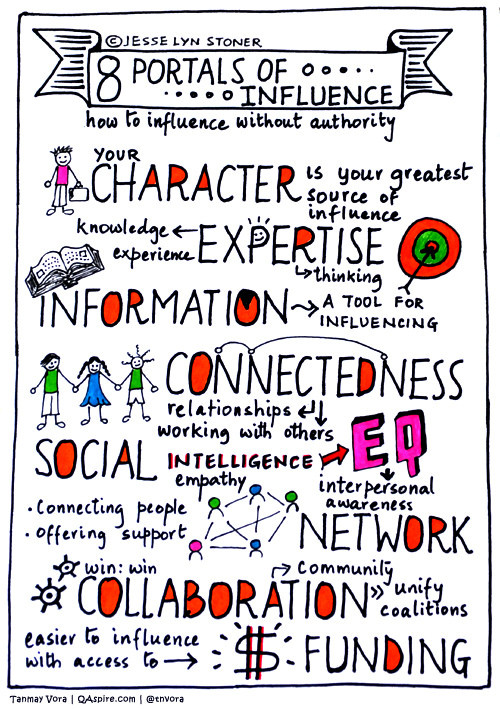I am delighted and honored that Tanmay Vora created this Sketch Note of “The 8 Portals of Influence,” described in more detail in my blog How to Influence Without Authority. In today’s complex world, leaders need to develop multiple channels of influence. These alternative paths to leadership can be effective when you don’t have or don’t want to use authority. You don’t need to have access to all eight portals, but if you want to be effective, it helps to develop more than one.
I am a big fan of Tanmay Vora’s insightful, award-winning leadership blog, which I read regularly. He is recognized as one of the Top 5 Indian HR Influencers on Social Media.
Also a talented photographer and artist, he has created several other excellent Sketch Notes including The Art of Effective Mentoring, Nine Roles for Great Leaders, and Leadership Lessons from Dr. A. P. J Abdul Kalam. You can find Tanmay Vora on Twitter @Tnvora and on Facebook.














Tanmay’s Sketch Note is a great way to communicate the original post, “How to Influence Without Authority,” which I would especially recommend to anyone interested in servant leadership.
Thank you, Joe. My original post is my all time most popular post, with over 40,000 views.
This, along with the original post, is phenomenal, as always… I love when you said in the post above: “These alternative paths to leadership can be effective when you don’t have or don’t want to use authority.” My career was and still is in education. This would be a great topic for educators within their Professional Learning Networks or PLNs. For sure, one way to approach education is through the dependence on authority – which I guess they indeed do have. But the educator seeking to optimize effective student learning almost certainly doesn’t want to use that authority. HENCE THE IMPORTANT PLN TOPIC!!!
The other item in the sketch that impacts teachers and all others (having authority or not) is the portal, ‘EXPERTISE’. Note it does include knowledge… BUT it also includes experience and thinking. Not wishing to put words in others’ mouths, I’ll just note how fantastic this characterizes – IN MY VIEW – the value of knowledge: In and of itself, knowledge (with recall) will help if a contestant on Jeopardy!!! Add to that knowledge, experience and thinking (expertise in other words), and the knowledge has value: it can be used, likely (I believe) to gather, understand, organize, and use related material to address situations of importance as they are encountered!!!
Another topic of importance for discussion in every PLN – not just Educational ones!!!
I agree that this topic is essential for educators, and also for parents.
Your comments about expertise are spot on. Expertise is the application of our knowledge, experience and meaning-making. Much thanks for adding to the conversation, John.
Jesse,
You have described the responsible use of power by illuminating it as “Portals of Influence.” People tend to have a negative image of power for all kinds of reasons, most of them having to do with deception, manipulation and coercion. The “Paradox of Power” by Dacher Keltner at UC Berkeley sheds some more light on this topic wherein he says “True power requires modesty and empathy, not force and coercion.” And Rob Jenkins defines the “Four Properties of Powerful Teachers” as personality, presence, preparation and passion. There’s much to be gained not only in understanding the dynamics of power but in our responsible and intelligent use of it for the common good.
The responsible use of power is such an important concept. Much thanks, Gary, for your explanation and also for sharing these resources.
I think anyone would be impressed and try and to do something like Tanmay did, thanks for sharing it – this shows that you care for your followers who love the way you pitch to help us understand about the niche like leadership.
I am touched and honored by your kind words, Robinsh. Thank you.